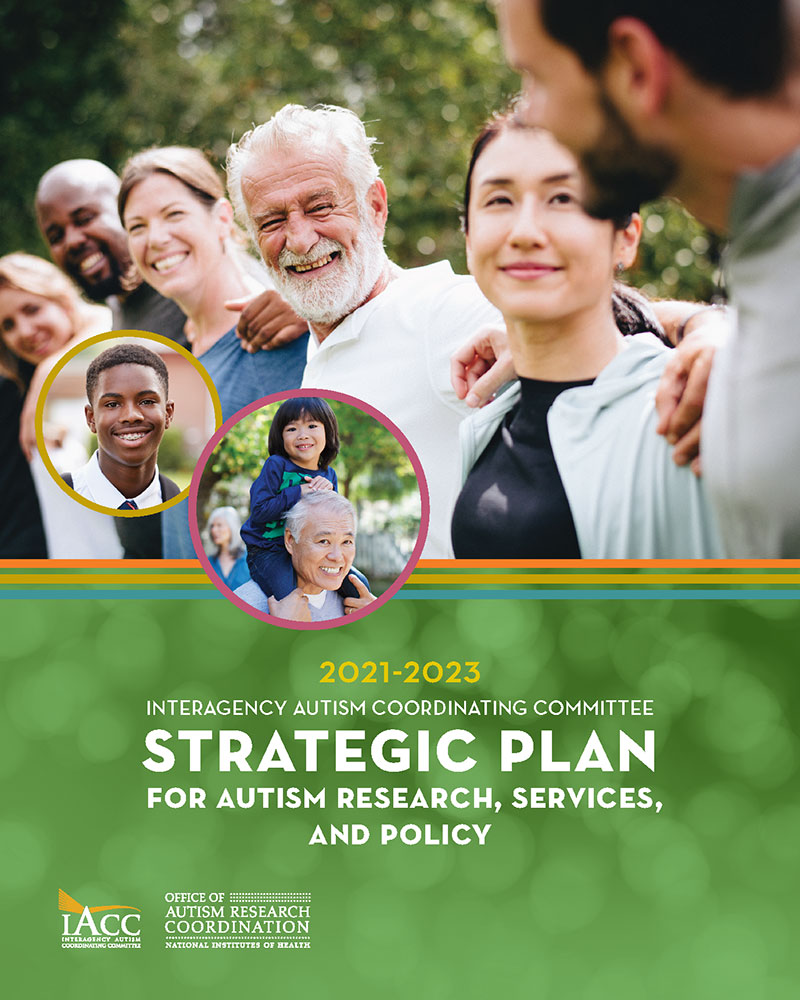IACC Strategic Plan
For Autism Research, Services, and Policy
2021-2023
The Autism CARES Act of 2019 requires the IACC in its Strategic Plan to provide "Recommendations to ensure that autism spectrum disorder research, services and support activities, to the extent practicable, of the Department of Health and Human Services and of other federal departments and agencies, are not unnecessarily duplicative."
The IACC believes that in the case of scientific research, coordinated efforts by multiple public and private agencies to fund different types of projects within the same topic area represent cooperation and collaboration, not duplication. In addition, the scientific process requires that studies be independently replicated in order to ensure reproducibility, validate findings, and ultimately build the evidence base. Replication of an experiment or approaching a single problem using different methods can corroborate findings and help researchers distinguish between false leads and important discoveries. Replication also contributes to efficiency in research funding by ensuring the creation of a solid base of validated findings that establish the rationale for later-stage, larger, and potentially more costly research efforts. For these important reasons, replication of research is valuable and should not be considered duplication of effort.
The 2021-2023 IACC Strategic Plan for Autism Research, Services, and Policy offers a range of broad Recommendations that are designed to address gaps and opportunities in ASD research, services, and support activities. The IACC’s intention is that each Recommendation will be accomplished through multiple projects addressing the many varied aspects of these complex issues, which will be funded by multiple agencies focusing on their respective and complementary areas of expertise. The IACC is charged with ensuring coordination across federal agencies, which is achieved by fostering dialogue among federal agencies and private organizations and engaging their input in the development of Strategic Plan Recommendations.
In addition to the IACC, the National Autism Coordinator (NAC) monitors and assists with internal coordination of federal autism efforts. As specified by the Autism CARES Act of 2014 (Public Law 113-157), the NAC is an existing official within the Department of Health and Human Ser-vices appointed "to oversee, in consultation with the Sec-retaries of Defense and Education, national ASD research, services, and support activities." The duties of the NAC include coordination and implementation of federal autism activities, taking into account the IACC Strategic Plan, as well as ensuring that federal autism efforts are not unnec-essarily duplicative. The NAC accomplishes cross-agency and cross-departmental coordination in part through the activity of the Federal Interagency Workgroup on Autism (FIWA), an all-federal working group of representatives from the following federal departments and agencies:
Department of Health and Human Services (HHS)
- Administration for Children and Families (ACF)
- Administration for Community Living (ACL)
- Agency for Healthcare Research and Quality (AHRQ)
- HHS Office of the Assistant Secretary for Planning and Evaluation (ASPE)
- Centers for Disease Control and Prevention (CDC)
- Centers for Medicare & Medicaid Services (CMS)
- Health Resources and Services Administration (HRSA)
- Indian Health Service (IHS)
- National Institutes of Health (NIH)
- Substance Abuse and Mental Health Services Administration (SAMHSA)
Department of Education (ED)
Department of Defense (DoD)
Department of Justice (DOJ)
Department of Housing and Urban Development (HUD)
Department of Labor (DOL)
Department of Transportation (DOT)
Environmental Protection Agency (EPA)
Social Security Administration (SSA)
Food and Drug Administration (FDA)
Department of Veterans Affairs (VA)
In addition to managing FIWA activities, the NAC also monitors activities of other federal interagency groups whose activities are relevant to autism (see Table 1).
Going forward, the combined activities of the IACC and the NAC will continue to help ensure that autism research, services, and supports activities are not unnecessarily duplicative.




